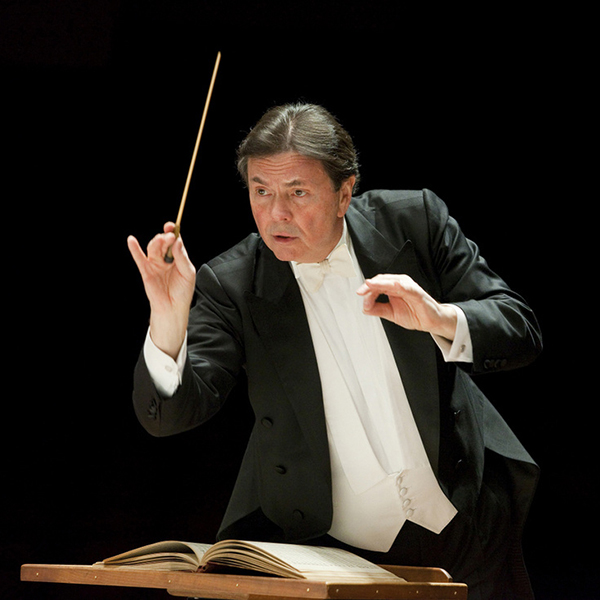
Internationally recognized for his moving performances, innovative programming and extensive catalog of recordings, American conductor Gerard Schwarz serves as Music Director of the All Star Orchestra and the Eastern Music Festival in addition to Conductor Laureate of the Seattle Symphony. Mr. Schwarz’s latest project, The All-Star Orchestra, features a handpicked ensemble of star players from America’s leading orchestras coming together for an eight episode American Public Television series designed to encourage a greater understanding and enjoyment of classical music.
His considerable discography of nearly 350 showcases his collaborations with some of the world’s greatest orchestras including Philadelphia Orchestra, Czech Philharmonic, London Symphony, Berlin Radio Symphony, Orchestre National de France, Tokyo Philharmonic, Los Angeles Chamber Orchestra, New York Chamber Symphony and Seattle Symphony among others.
Schwarz began his professional career as co-principal trumpet of the New York Philharmonic and has held leadership positions with Mostly Mozart Festival, Royal Liverpool Philharmonic and Los Angeles Chamber Orchestra and New York Chamber Symphony. As a guest conductor in both opera and symphonic repertoire, he has worked with many of the world’s finest orchestras and opera companies.
Schwarz, a renowned interpreter of 19th century German, Austrian and Russian repertoire, in addition to his noted work with contemporary American composers, recently completed his final season as music director of the Seattle Symphony in 2011 after an acclaimed 26 years a period of dramatic artistic growth for the ensemble.
In his nearly five decades as a respected classical musician and conductor, Schwarz has received hundreds of honors and accolades including Emmy Awards, GRAMMY nominations, ASCAP Awards and the Ditson Conductor’s Award. He was the first American named Conductor of the Year by Musical America and has received numerous honorary doctorates. Most recently, the City of Seattle and named the street alongside the Benaroya Hall “Gerard Schwarz Place.”
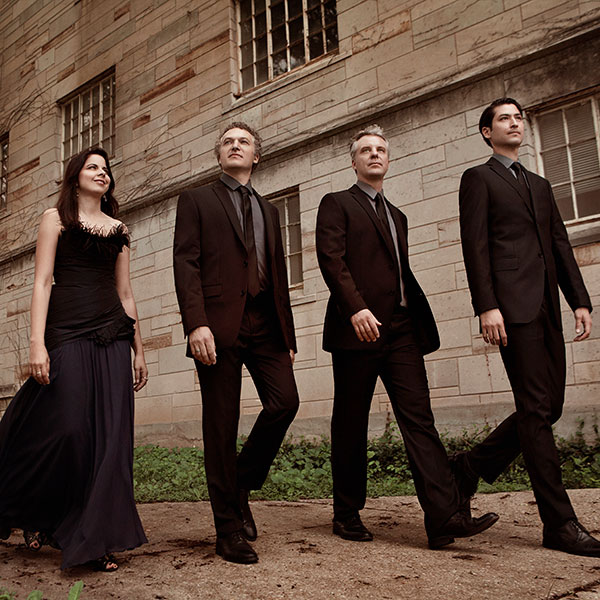
Recognized for its virtuosity, exuberant performance style, and daring repertory choices, over the past two decades the Pacifica Quartet has gained international stature as one of the finest chamber ensembles performing today. The Pacifica tours extensively throughout the United States, Europe, Asia, and Australia, performing regularly in the world’s major concert halls. Named the quartet-in-residence at Indiana University's Jacobs School of Music in March 2012, the Pacifica was also the quartet-in-residence at the Metropolitan Museum of Art (2009 – 2012) – a position that has otherwise been held only by the Guarneri String Quartet – and received the 2009 Grammy for Best Chamber Music Performance.
The members of the Pacifica Quartet live in Bloomington, IN, where they serve as quartet-in-residence and full-time faculty members at the Jacobs School of Music. Prior to their appointment, the Quartet was on the faculty of the University of Illinois at Champaign-Urbana from 2003 to 2012. The Pacifica Quartet also serves as resident performing artist at the University of Chicago.
For more information on the Quartet, please visit www.pacificaquartet.com.
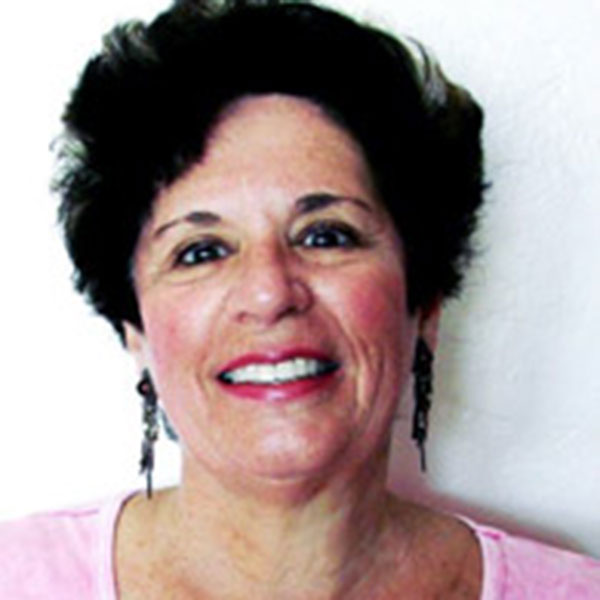
Composer Judith Lang Zaimont is internationally recognized for her distinctive style, characterized by its expressive strength and dynamism. Recent accolades include a 2003 Aaron Copland Award, and a 2005-6 Artists Fellowship from the Bush Foundation, and the 2006-7 Kaplan Foundation wind ensemble commission; appointments as Commissioned Composer of the California Music Teachers Association, Commissioned Composer for the International San Antonio Piano Competition, and Honored Composer at the 11th Van Cliburn International Competition (2001). Three new CDs of her music are now available: “Pure Colors,” solo music and other works for small ensembles (Albany Music – Troy 785), “Sacred Service for the Sabbath Evening” and other major choral/orchestral works (Naxos 8.559444) and Prestidigitations – contemporary concert Rags (MSR 1238)
Among her many earlier honors are a Guggenheim Fellowship, artist’s grants from both National Endowments (Arts and Humanities), and First Prize in the international 1995 McCollin Competition for Composers (for “Symphony No. 1”, performed by the Philadelphia Orchestra in 1996). Her music is widely performed throughout the U.S. and Europe and has been recorded for the Naxos, Koch International Classics, Arabesque, Milken Family Foundation, Albany, Jeanne, Leonarda, Northeastern, MSR Classics and 4Tay labels. Her principal publishers are MMB Music, Inc., Galaxy/ECS, Vivace, Jeanné, C. F. Peters, Lyra and Walton.
Her music has been widely documented (12 doctoral papers to date), and her biography is found in most standard reference works (e.g. New Grove’s). Zaimont works are cited on two “Best of the 20th Century lists” (Chamber Music America; Piano & Keyboard Magazine), and she is the subject both of individual chapters in specialist volumes and major articles in professional journals. Judith Zaimont also brings outstanding academic credentials to her musical activities, having served for many years as a distinguished composition teacher at New York’s Queens College and Adelphi University, Baltimore's Peabody Conservatory, and Minneapolis’s University of Minnesota School of Music. More information about Ms. Zaimont, including sound clips of many of her compositions, is available at her website http://www.jzaimont.com/.
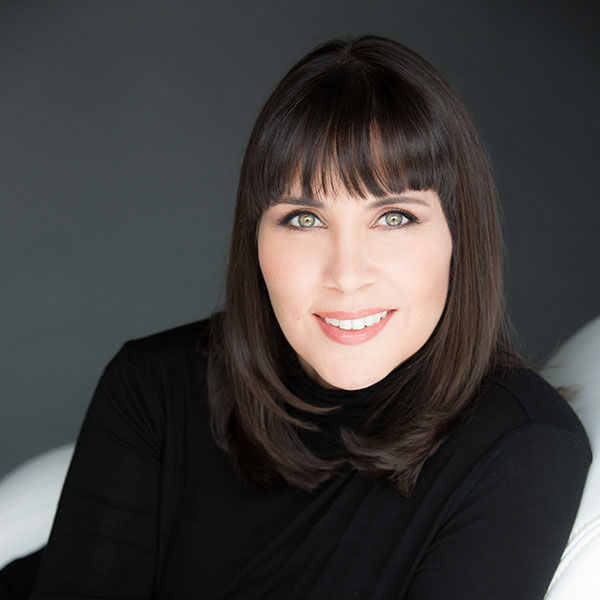
Possessing a voice praised by the San Francisco Chronicle for its "effortless precision and tonal luster," soprano Jessica Rivera is established as one of the most creatively inspired vocal artists before the public today. The intelligence, dimension, and spirituality with which she infuses her performances on the great international concert and opera stages has garnered Ms. Rivera unique artistic collaborations with many of today's most celebrated composers, including John Adams, Gabriela Lena Frank, Osvaldo Golijov, Jonathan Leshnoff, and Nico Muhly, and has brought her together in collaboration with such esteemed conductors as Bernard Haitink, Sir Simon Rattle, Esa-Pekka Salonen, Robert Spano, and Michael Tilson Thomas.
Ms. Rivera's 2015-2016 season features performances of Beethoven's Symphony No. 9 with Giancarlo Guerrero and the Nashville Symphony, excerpts from Canteloube's Chants d'Auvergne with Josep Caballé-Domenech and the Colorado Springs Philharmonic, a pops concert with Richard Kaufman and the Pacific Symphony, Strauss' Four Last Songs with Richard Sowers and the Anderson Symphony Orchestra, Joshua Roman's song cycle "we do it to one another" with Town Hall Seattle, Strauss' Orchesterlieder with Johannes Stert and the Orquestra Sinfónica Portuguesa in Lisbon, Villa-Lobos' "Bachianas Brasileiras No. 5" with Marcelo Lehninger and the Grand Rapids Symphony, and Brahms' Ein deutsches Requiem with Alexander Shelley and the National Arts Centre Orchestra in Ottawa, and with Robert Spano and the Atlanta Symphony Orchestra with performances in Atlanta and at New York's Carnegie Hall. She will also join the Teatro Nacional de São Carlos in Lisbon as Kumudha in John Adams' A Flowering Tree, a role she created, under the baton of Joana Carneiro.
Highlights of Ms. Rivera's 2014-2015 season included performances of Beethoven's Symphony No. 9 with Peter Oundjian and the Toronto Symphony Orchestra, Brahms's Ein deutsches Requiem with Robert Spano and the Milwaukee Symphony Orchestra, Falla's Siete Canciones Populares with Nicholas Carter and the Dallas Symphony Orchestra, a concert celebration of "Día de los Muertos" with Donato Cabrera and the San Francisco Symphony, Mahler's Symphony No. 2 with Laura Jackson and the Reno Philharmonic, Theofanidis's Creation Oratorio with Robert Spano and the Atlanta Symphony Orchestra, Handel's Messiah with Norman Mackenzie and the Atlanta Symphony Orchestra, a New Year's Eve concert with David Robertson and the St. Louis Symphony Orchestra, the world premiere of Gabriela Lena Frank's La Centinela y la Paloma with the Detroit Symphony Orchestra, and Mozart's Mass in C Minor with Marcelo Lehninger and the New West Symphony. She also reprised her critically-acclaimed portrayal of Kitty Oppenheimer in John Adams's Doctor Atomic for a debut at the Teatro de la Maestranza in Seville, Spain.
Ms. Rivera was heralded in the world premiere of John Adams' opera, A Flowering Tree, singing the role of Kumudha, in a production directed by Peter Sellars as part of the New Crowned Hope Festival in Vienna. Since then, she has performed A Flowering Tree for her debut with the Berliner Philharmoniker with Sir Simon Rattle and, under the composer's baton, with the Cincinnati Opera, San Francisco Symphony, the Los Angeles Philharmonic, the Orchestra of St. Luke's at Lincoln Center, and the London Symphony Orchestra at the Barbican Centre. The London performances were recorded and are commercially available on the Nonesuch Records label.
The artist made her European operatic debut as Kitty Oppenheimer in Peter Sellars's acclaimed production of John Adams's Doctor Atomic with the Netherlands Opera, a role that also served for her debuts at the Lyric Opera of Chicago and Finnish National Opera, and she joined the roster of the Metropolitan Opera for its new production of Doctor Atomic under the direction of Alan Gilbert. She gave concert performances of Doctor Atomic with Robert Spano and the Atlanta Symphony Orchestra, and her portrayal of Kitty Oppenheimer was captured in Amsterdam and is commercially available on DVD on the BBC/Opus Arte label.
Highlights of recent seasons include performances of El Niño with David Robertson and the Saint Louis Symphony Orchestra, the San Francisco Symphony and at the Edinburgh International Festival with James Conlon and the BBC Scottish Symphony Orchestra, Nixon Tapes with the Pittsburgh Symphony under the direction of John Adams, Górecki's Symphony No. 3 ("Symphony of Sorrowful Songs") with Gustavo Dudamel and the Los Angeles Philharmonic, Mahler's Fourth Symphony with Franz Welser-Möst for a debut with the Cleveland Orchestra, Beethoven's Ninth Symphony with Sir Roger Norrington and the Orchestra of St. Luke's at Carnegie Hall, with Bernard Haitink and the Chicago Symphony Orchestra and with Michael Tilson Thomas and the Los Angeles Philharmonic, Britten's Spring Symphony with Robert Spano and the Atlanta Symphony Orchestra, Carmen with Bramwell Tovey and the Los Angeles Philharmonic, Poulenc's Gloria with Mr. Haitink and the Chicago Symphony Orchestra, which she also sang with Grant Gershon at the Hollywood Bowl, and Ravel's Shéhérazade with Mr. Tilson Thomas and the San Francisco Symphony.
Ms. Rivera made her critically acclaimed Santa Fe Opera debut in the summer of 2005 as Nuria in the world premiere of the revised edition of Osvaldo Golijov's Ainadamar. She reprised the role for the 2007 Grammy Award-winning Deutsche Grammophon recording of the work with the Atlanta Symphony Orchestra under Robert Spano, and bowed in the Peter Sellars staging at Lincoln Center, Opera Boston, as well as in performances at the Barbican Centre, the Adelaide Festival of Arts, Cincinnati Opera, and the Ojai, Ravinia, and New Zealand International Arts Festivals. The artist's first performances of Margarita Xirgu in Ainadamar, a role created by Dawn Upshaw, occurred in the summer of 2007 at the Colorado Music Festival under the baton of Michael Christie and she reprised the part recently for Madrid's Teatro Real.
Committed to the art of recital, Ms. Rivera has performed in concert halls in New York, Los Angeles, San Francisco and Santa Fe. In a national recital tour, Ms. Rivera was joined by mezzo-soprano Kelley O'Connor and pianist Robert Spano for concerts at Carnegie Hall, Cal Performances, Berkeley, Kennesaw State University, Pepperdine University, and at Cincinnati's Constella Festival. In past seasons, to support a recital disc on the Urtext Records label that examines works for soprano, clarinet, and piano, Ms. Rivera toured North America with concerts in Los Angeles, New York (Carnegie Hall), Las Vegas, Oklahoma City, and Chicago (Ravinia Festival). She also has given a recital program at the Amelia Island Festival accompanied at the piano by Robert Spano. She was deeply honored to have received a commission from Carnegie Hall for the world premiere of a song cycle by Nico Muhly called The Adulteress given on the occasion of her Weill Hall recital performance.
For additional information about Ms. Rivera, please visit www.jessicarivera.com.
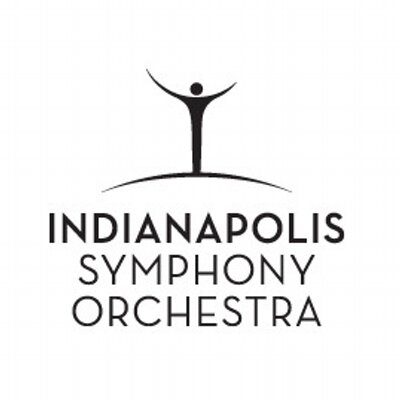
The Indianapolis Symphony Orchestra was founded in 1930 by German conductor and local violin teacher Ferdinand Schaefer. At first comprised of volunteer musicians who split the revenue from ticket sales, the ISO became a professional orchestra with salaried musicians in 1937. That same year, Fabien Sevitzky – a Russian-born conductor and nephew of famed conductor Serge Koussevitsky – became Music Director of the ISO. Sevitzky’s appointment was highlighted in an April 5, 1937 article in Time Magazine, which began, “Of Midwestern orchestras, none has risen so rapidly or so recently as the Indianapolis Symphony.”
The mission of the Indianapolis Symphony Orchestra is to inspire, entertain, educate and challenge through innovative programs and symphonic music performed at the highest artistic level.
Soon after, the ISO blossomed into one of the nation’s most renowned orchestras. Sevitzky worked to promote the ISO through a variety of national radio broadcasts, and his successor, Izler Solomon, ensured the creation of the Clowes Memorial Hall on the campus of Butler University as a venue meant specifically for the ISO (until then, the ISO had been performing at the Murat Theater). Throughout the 1950s and 60s, the ISO traveled around the world to perform “Salute” concerts in countries such as Finland, Korea, Japan, Formosa, Portugal, The Netherlands, Israel, Mexico, Austria, Venezuela, Thailand, Greece and Chile – earning the Orchestra a Citation from the Voice of America and the United States Information Agency as well as a letter of commendation from President John F. Kennedy – the first ever such commendation to a symphony orchestra.
Solomon’s successor, John Nelson (1976-1987), is associated with the Orchestra's appearances at Carnegie Hall and the Kennedy Center, plus a debut European tour in 1987. In the summer of 1982, a 14-year-old violinist named Joshua Bell was the first performer for the ISO's Marsh Symphony on the Prairie series, and in 1984, the ISO moved downtown to its new home at the restored movie palace -- the Circle Theatre.
In 1987, internationally renowned performer, conductor and composer, Raymond Leppard (1987-2001) was selected as the Orchestra's fifth Music Director. During his tenure, several key accomplishments took place: a return to regular recording with a series of CDs on the Koss Classics and Decca labels; performances on NPR's "Performance Today"; nationally-syndicated radio broadcasts of ISO concerts; acclaimed tours on the East Coast and two tours of Europe; and a performance at Carnegie Hall as part of the venue's centennial season.
Following Maestro Leppard's retirement, Mario Venzago was appointed Music Director (2002-2009) and led the Indianapolis Symphony Orchestra in a deeper commitment to repertoire of the mid-19th century -- specifically works by Felix Mendelssohn and Robert Schumann -- the Second Viennese School, contemporary scores and new commissions, including Jennifer Higdon's Violin Concerto with world renowned violinist Hilary Hahn in 2008.
In the fall of 2007, Zachary De Pue was named Concertmaster for the Indianapolis Symphony Orchestra, and Alexander Kerr was appointed Principal Guest Concertmaster, a position utilized by only a handful of orchestras throughout the world. In October 2009, string trio Time for Three became the first artists-in-residence for the ISO.
In September 2011, Krzysztof Urbański began his tenure as the seventh Music Director of the ISO, and upon his appointment, was the youngest Music Director of any major American orchestra. Today, Maestro Urbanski is one of the most acclaimed and respected young conductors in the world.




